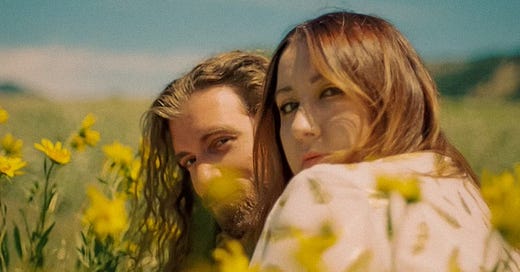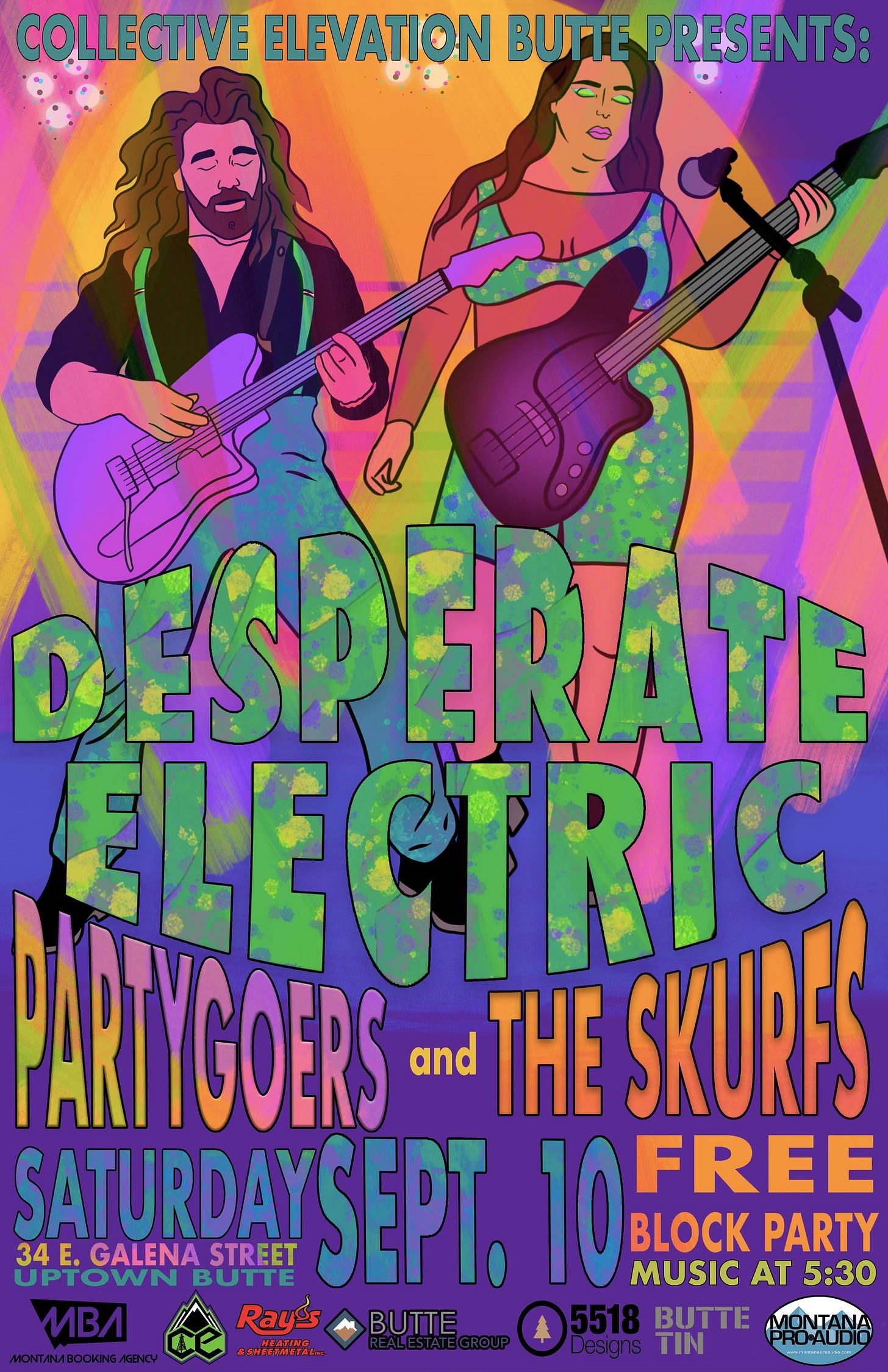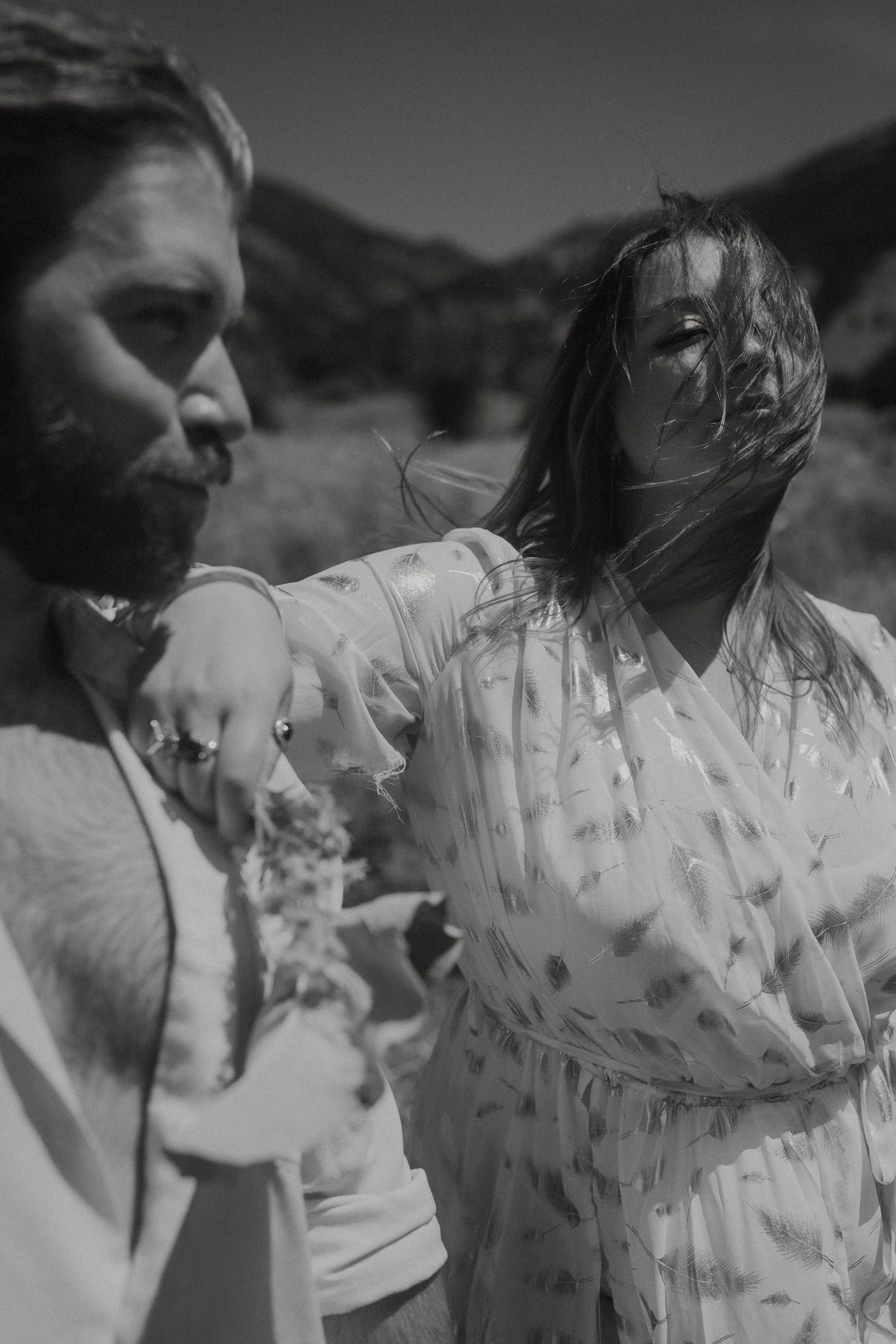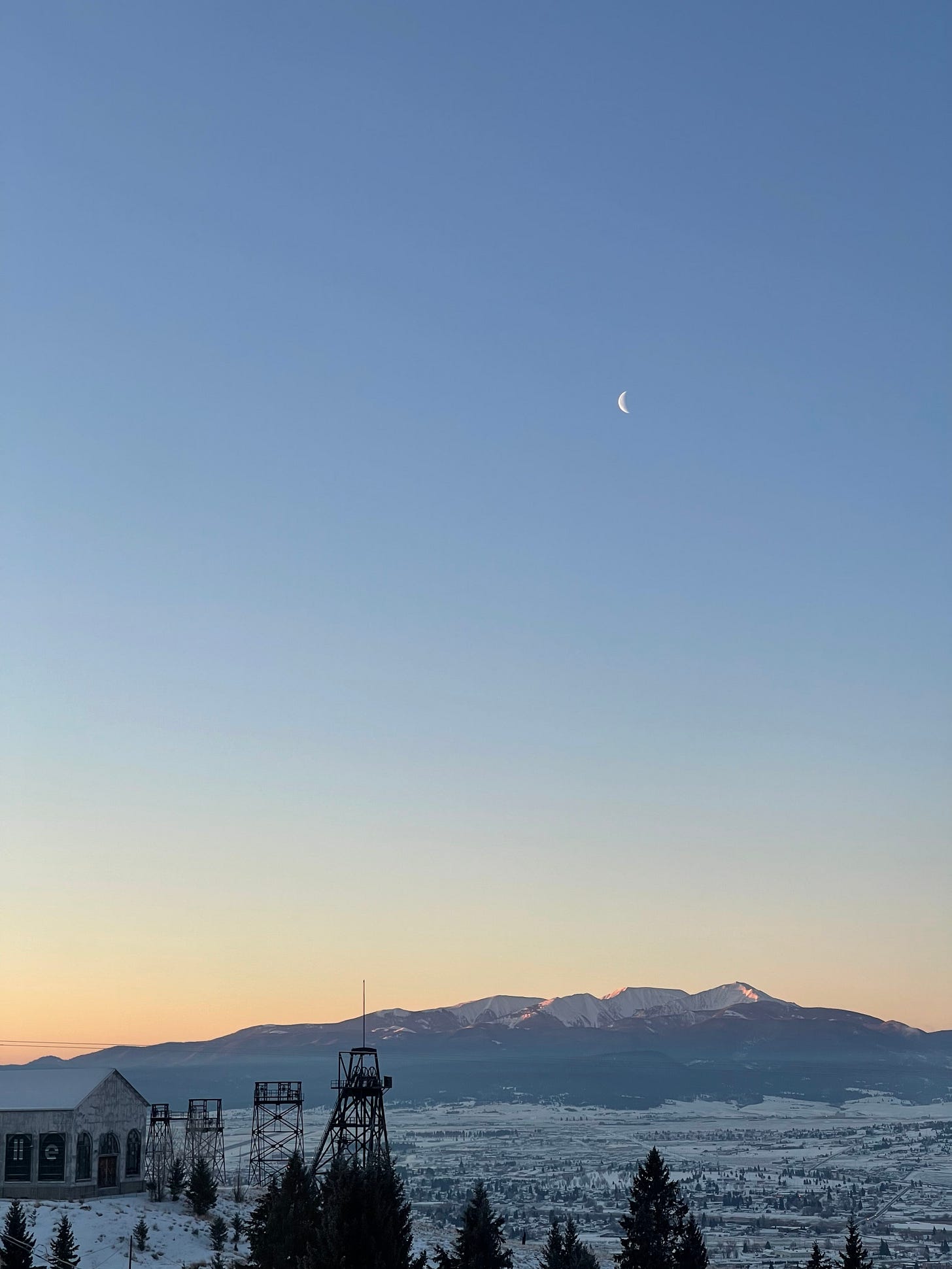Part II: What Do You Want by Desperate Electric
Speaking of friendship, concerts, and fun (see Part I), I need to introduce you to two of my very best friends, Ben and Kayti. Together they compose the dynamic electro-soul duo, Desperate Electric.
Fusing elements of funk, rock, soul, pop, and R&B, with cosmo-tronic production, they create a musical experience that’s both futuristic and nostalgic.
They move the listener to think and reflect by peering into their mirrors’ darkest corners, openly exploring who they are, what they’ve done, who they want to be, and how they need to change, grow, or evolve. They’re chasing authenticity and accountability, which is to say: real love. And they weave insights from this journey through potent instrumentations and dazzling vocals.
One can hear the subtleties between hope and power, aspiration and desperation as they wrestle with the truth’s contradictions, face the humbling nature of honesty, and embrace, though sometimes reluctantly, the freedom and responsibility of love.
Love is work, but it is worth it, they remind.
Desperate Electric evolved from a four-piece power rock band named Dash. When keeping four committed band members became impossible, they almost lost hope. Thankfully, they did not. They found a way forward.
No—they made a way forward: Kayti learned to play bass, Ben recorded drum tracks, they produced a vexing self-titled EP and hit the road in Vicki the Van. Three years later, they’re still making a way. Still recording and touring.
Still looking for that feeling, as they sang in a luscious duet from 2020:
I’m looking for that feeling, I don’t know what to believe in now
Everything that I found has been a dead-end road somehow
I’m looking for that feeling every minute that this world goes round
How many more turns before I flip it upside down.
Then, turning doubt to defiance:
I’m looking for that feeling, I don’t know what to believe in now
Turns out I got what you need and I’m gonna put it down
I’m looking for that feeling I’m all that I believe in now
So just shut your mouth and watch me tear this place inside out!
Looking is still one of my favorites. Originally written and performed as a rock song, they recomposed it in collaboration with friend and talent Emmet Ore, who performs both as Hxrse and with the tectonic dance grooves of Shakewell.
These three make beautiful music together. Last fall, they released a hypnotic sixteen-minute EP, Only Good Times. Fuzzy, dark, dreamy, lucid and jazzy, it’s devastating and invigorating, soothing and stimulating. Watch them perform the full EP below.
The duo brings so much passion and purpose to their music, their relationships.
Even so—even with each other, the world can feel lonely. We can feel lost trying to understand and express the things we see and feel. Good examples of real authenticity, accountability, and reflection are scarce in our current media-infosphere.
We’re mostly inundated with bad faith puffery, dishonesty, misdirection, demagoguery, and white noise, all drowning out real dialogue.
Where are we going?
Where do we want to go? What do we have to do to get there? How do we have to change? Our responses to these questions define our existence.
Ben and Kayti answer them unequivocally: they want to make music for a living. Their second album What Do You Want, out tomorrow (Friday, September 9), expresses the freedom, pain, joy, despair, and resilience of this journey toward authenticity together.
Even as they grow more comfortable, more confident in their craft and purpose, they can’t escape wondering whether they’re just wasting their time:
Sing into the void, I hope my ego don’t get destroyed.
I know it’s not the point. But I still need something, I still need something.
If you could hear my voice, you’d hear me telling you look around.
Is there anyone else out there that puts it down, like I do?
What Do You Want, the title track, charges through the self-doubt always lingering close-by, eventually reaching a dance party in the stars. They released this and four other songs as singles throughout the summer.
The first of these releases, Karaoke is about budding love. Ben sings the hook with delight and some hesitation. Love is scary, he told me recently, but that doesn’t mean you shouldn’t give it a chance, and perhaps eventually, give in to it. It can be worth it.
In Stop Making Noise, Kayti flows with dynamism and comfort. She’s had enough of the games and needs peace, stability, solitude. Her smooth vocals bridge into a trancey dance-y party. There’s no escape. See the Stop Making Noise music video here.
Stay is a long look into a dark mirror. It caught the ear of music reviewer Gabriel Mazza, who describes it quite well:
Championing a fierce message of courage and openness, ‘Stay’ navigates the troubled waters of human experience, helping the listener deal with problems instead of running away from them.
Toasty, in contrast, is a bubble bath in the sun, cocktail in hand. Fun and upbeat, enamored and blissful, Ben sings out:
Your loves a drug, and I was hoping you would dose me.
You light my fire, so come on over let’s get toasty.
You know me, you know me, I know you and slowly
We don’t speak, our bodies talk
As our souls begin to interlock.
You can listen to each of these songs right now. As I mentioned, the full album, What Do You Want, is out tomorrow wherever you listen to music.
[update: WHAT DO YOU WANT out now]
They’re celebrating the launch this weekend with two shows. First, in Billings on Friday at Thirsty Street. Then Saturday, with a Block Party in Uptown Butte, on 34 E. Galena Street (see poster below). After that, they’re hittin’ the road.
See Desperate Electric’s tour calendar.
You really don’t want to miss them. Their live performances radiate freedom and fun.
Kayti has natural power and presence on stage. She started singing publicly for larger crowds at around seven years old, at rodeos and other sporting events. As she got older, she realized who she was in those spaces, was not a complete expression of who she knew she could be. She’s freeing herself in the songs she writes.
She’s finding her most authentic being. Learning through classical voice training, choirs, karaoke, and a few years on the road, she is becoming a force in an industry that often assumes she’s just Ben’s girlfriend, helping him set up. Unfazed, she steps on the stage alongside him and lights the place up.
Anything or anyone in her way would be wise to step aside. Apathy be the death of she.
Ben complements Kayti in all the right ways. Though his musical mastery speaks for itself. Pure genius. Hand the dude an instrument, or a mic, and he’ll blow your mind. With Desperate he’s on the keys, drums, and guitar; writing, singing, and producing.
He started with piano at age 6 or 7, learned bass a few years later, then guitar, playing drums throughout that time. He played in his first band around 11 and started writing original music with friends like Nevada Sowle around 14. There must’ve been Something in the Water back then ‘cause they’re both still at it today.
Later, Frank Ocean’s Channel Orange woke Ben to the soothing energy of R&B and the power of truth-telling in music. Real love, I’m searching for that real love, Ocean sings as he describes the emptiness of wealth and extravagance. Wealth is found, not in mansions, boats, and expensive cars, but in real love, real friendships.
Friendships are real when they’re reciprocal, accountable, genuine, and kind.
Ben and Kayti remind me of this, even an ocean away. Through their music, they remind me to keep it real, to allow myself to be open and vulnerable, and to always strive for truth and authenticity, personally and relationally.
This all takes work. Friendship is work, but it is worth it. Just like love.
An Afterword on Labor and Union
Speaking of work, Labor Day came and went on Monday. Though one truth remains: the people paid the least, do the work the world cannot survive without.
I’m talking about those people planting and seeding, picking and harvesting, loading, unloading, and stocking fresh foods. The small farmers who feed the world. The cooks, servers, and cleaners. Caretakers, educators, and counselors for all: young, old, and ill. Garment workers, factory workers, warehouse workers. Even plumbers, mechanics, and electricians, wildland firefighters, and especially water protectors.
Without this work, it all falls down.
Some of these jobs have unions to secure their safety, dignity, and wellbeing. Most of the more dangerous, low-wage farm, domestic, and service jobs, however, are done by ‘migrants’ who, because of this invented legal class, are deprived of agency and dignity under the law.
It is an unmistakable crime against humanity to differentiate and immiserate people like this. Especially so when we realize, as Olúfémi Táíwò distills in Reconsidering Reparations, “our political communities live within borders that have been produced by war and conquest more often than fairly negotiated development between communities.”
Borders, like race, are not real. They are legal inventions generating difference and justifying the ongoing subjugation, exploitation, and commodification of life.
Unions resist this empty death march by harnessing the collective power of those who actually do the hard work. They help us to see and express the power of our connection and interdependence.
Butte, Montana, where Ben and Kayti live and record, was once a beacon of Unionism. Copper mined from the hills of Butte electrified the world. For decades, miners went thousands of feet deep into the earth, fourteen hours at a time, drilling cylindrical holes into solid rock, filling them with sticks of dynamite, detonating, and then loading those shattered rocks onto an elevator upward.
This activity killed a person almost every other day, while a handful of financial speculators amassed absurd fortunes and exercised unaccountable political control. Sound familiar?
Forming unions was a matter of life and death to the working people of Butte. And they formed these unions somewhat beyond the illusions of borders and nationality.
“There were few cities in America as international in flavor as Butte in the late nineteenth century,” Brad Tyer writes in Opportunity, Montana: Big Copper, Bad Water, and the Burial of an American Landscape. “Company posted no-smoking signs were printed in sixteen languages,” he notes.
These different peoples from different parts of the world came together because dying for the fortune and luxury of the idling William A. Clark, Augustus Heinze, Marcus Daly, and later, the Amalgamated Rockefeller trust, was not worth it.
They knew they deserved more from life. They deserved agency and dignity. They unionized because they learned we are better, more powerful and resilient, in Unions: collectives, cooperatives, communities, and democracies that are true and genuine.
They heard the music of life in the beautiful harmonies of friendship and solidarity: in honest, respectful, reciprocal, and regenerative relationships.
We could hear it too, if only we had the courage and humility listen.
Thanks for reading. As always, I’d love to hear from you:
e-mail: hey.blueworld@gmail.com
instagram: @blueworldblog
twitter: @mattasaro








So grateful to have been the focus of your writing this week 🙏 and humbled by your ability to connect us and our work to the greater unity of humanity.
Such a poetic tribute to your talented friends ✨❤️🌏